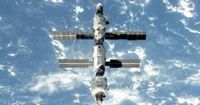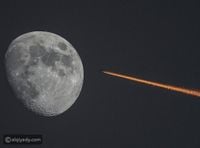Seoul, April 15 (Yonhap) -- South Korea and the United States are ramping up their efforts to collaborate in the realm of space exploration, particularly focusing on lunar missions and satellite navigation, as they navigate an increasingly competitive international marine landscape. The announcement came following the fourth round of the Space Dialogue held in Washington on April 14, 2025, marking the first high-level discussions on space cooperation since the inception of Donald Trump's second term as president.
According to South Korea's Foreign Ministry, the two allies are keen to expand South Korea's involvement in the U.S. Artemis program, which aims to return humans to the Moon, and to ensure that Seoul plays a sustainable role in major U.S. space missions led by NASA. This initiative reflects a broader strategy to enhance bilateral engagement between the developing Korean positioning system and the American Global Positioning System (GPS).
During the discussions, officials from both nations emphasized their commitment to ensuring safe space activities and promoting long-term sustainability of outer space. "We have participated in a tangible way in the discussions, including consultations on the level of work on the level of the two general managers with the American Space Agency, in cooperation with the relevant ministries," the ministry stated.
The dialogue also highlighted the growing significance of maritime awareness, leveraging space assets to bolster cooperation in information and basic science. This is particularly relevant as both nations seek to address the complexities of marine operations in the context of space technology.
Furthermore, the two sides are exploring ways to build a resilient supply chain for the space industry, which includes sharing data on component testing and radiation tests. The ministry affirmed that both countries are committed to enhancing safe space exploration and agreed to pursue trilateral space cooperation with Japan in specific and commercial sectors.
This latest round of talks comes at a time when South Korea is not only looking to strengthen its ties with the United States but is also actively participating in multinational air maneuvers in the Emirates. These maneuvers signify a broader commitment to regional security and defense collaboration.
In a separate but related matter, the South Korean Foreign Ministry also reported ongoing negotiations with the United States regarding South Korea's recent designation on a sensitive list by the U.S. Department of Energy. This list, which includes countries like North Korea, China, and Russia, has raised concerns about its implications for scientific and technological cooperation between the two allies.
The ministry clarified that while the issue is being handled according to internal American procedures, it may take additional time to resolve. "We are urging the relevant institutions affiliated with the Space Agency or other partners for technological cooperation or other purposes," the ministry stated, emphasizing the importance of maintaining open lines of communication and collaboration.
Despite the challenges posed by this designation, the ministry reassured that the U.S. Space Agency has confirmed that this classification "will not affect bilateral cooperation in research and development currently or in the future." This assurance is crucial as both nations continue to navigate their partnership in the face of evolving geopolitical dynamics.
As South Korea strengthens its position in the global space arena, the collaboration with the United States is poised to play a pivotal role in shaping the future of space exploration and technology. The ongoing dialogues and agreements signify a commitment to not only enhance scientific endeavors but also to ensure that both nations can effectively respond to the challenges presented by an increasingly competitive international landscape.
With these developments, South Korea is also set to engage in maritime events with China this month, following their recent confrontations in the Yellow Sea. This engagement underscores the complexity of regional relations and the need for diplomatic efforts to maintain stability.
In conclusion, the discussions between South Korea and the United States reflect a shared vision for the future of space exploration, emphasizing collaboration, safety, and sustainability. As both nations work together to navigate the intricacies of space and marine cooperation, the outcomes of these dialogues will likely have lasting impacts on their strategic partnership.


